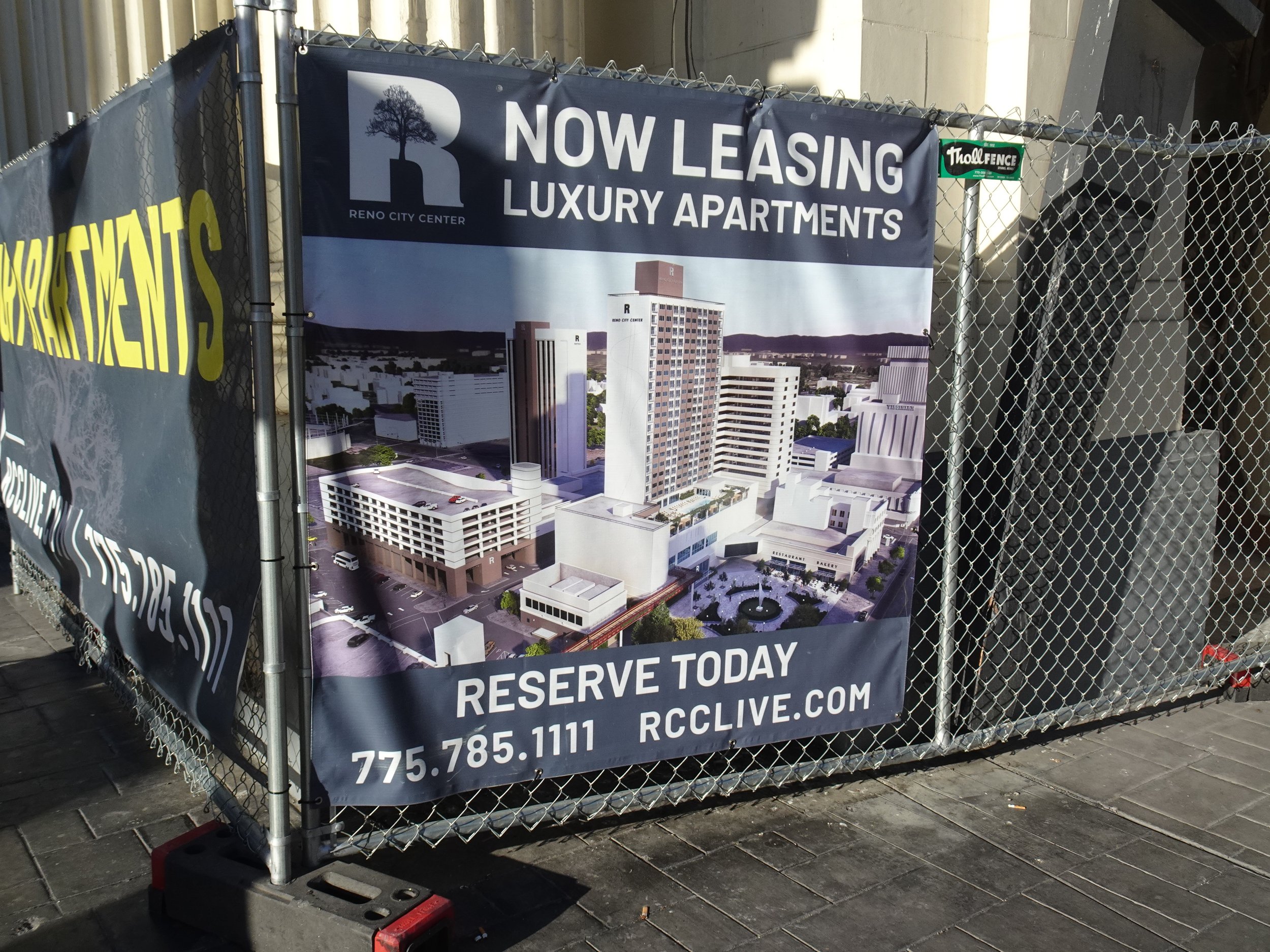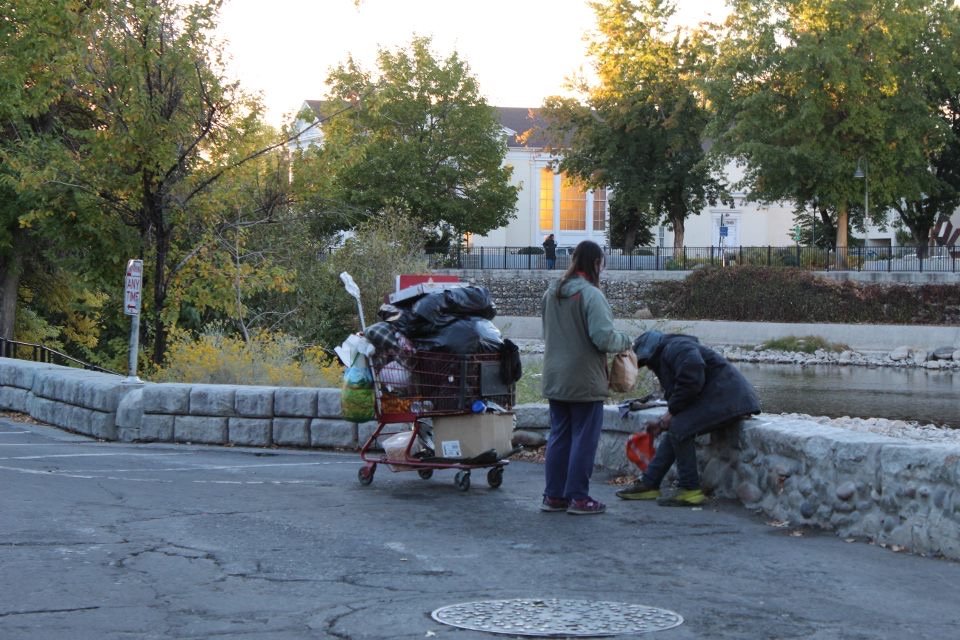“I just have a passion for making the world a better place and I think that we do that out of our deepening spirituality,” said Karen Foster, the reverend at south Reno’s Unitarian Universalist Fellowship of Northern Nevada. She has been the reverend there for almost four years. She believes that as humans deepen their spirituality it causes us to become more caring towards other people.
She has a knack for leadership and through her teachings, hopes to encourage all people to come together and help one another out, particularly when it comes to the unhoused crisis.
She said it is great that there are efforts being made to look at the issues surrounding homelessness, such as the establishment of the CARES Campus, located downtown on east Fourth Street. “But warehousing folks is not the answer,” Foster said.
“While we hope to see more progress on this issue, it’s hard to say whether that’s really a step in the right direction or not,” explained Foster as her shoes squeaked on the polished floor of her church, echoing in the large room. As winter approaches many are concerned the CARES Campus and safe camp are not adequately prepared for the bitter cold and stormy season.
“I mean we have to get folks off the streets, it’s a life threatening issue to have folks on the streets,” said Foster. She believes having overflow and emergency shelters as was the case previously were better during the colder months. When the pandemic first locked down society, the City of Reno opened up the Reno Events Center for the unhoused community as an emergency shelter to help maintain social distance and increase capacity, but that program was then disbanded.
Reverend Karen Foster advocates for more programs such as HopeSprings run by Northern Nevada Hopes.
“Really what we need to be doing more of is something like the model of Northern Nevada Hopes has developed with the tiny house neighborhood,” said Foster. These transitional homes (previous Our Town Reno article here: http://www.ourtownreno.com/our-stories-1/2020/10/15/hopesprings-a-new-bridge-housing-project-still-faces-financial-hurdles-to-open) allow people to take the initial step from living on the streets to secure housing and build a renting history. In turn, this history will enable people to get stable housing down the road. “Folks are allowed their own private spaces, they also have a way to be community and they have just an incredible amount of resources,” explained Foster, who recently toured the facility, which is a stones throw away from the CARES Campus.
People who want to stay there have to make a commitment to improving their situation. Social workers and medical care is provided through the program to help with addressing the issues that affect the unhoused, such as mental health, addiction, and poor nutrition.
“If we can expand on that model in a dramatic kind of way, that is a much, much better solution than warehousing,” said Foster.
Affordable housing is another part of the equation that Foster believes needs to be addressed. As more and more developers build tracts of luxury housing, and lower end housing is destroyed, the lower income communities of Reno become one step closer to becoming homeless.
“Reno has for too long allowed developers to have complete free reign,” Foster said. She has seen developers come in from out of town, develop a tract of luxury housing and “the money flows outward from the community in many, many cases.”
Foster believes this city council and county commissioners need to be much more forward thinking and look to successful examples around the country. “When a development proposal is made, it has to include either funding for low income housing or low income housing as a part of the project,” explained Foster. She firmly believes this has to happen with every new development and that if a stipulation like this was in place ten or fifteen years ago, there would not be an extreme shortage of affordable housing.
Foster’s work goes beyond her fellowship. She is also part of the group The Reno Posse. This group serves well over a hundred meals every week. The food they prepare is high quality, nutrient dense meals that often become more than one meal per person. “The city used to provide locations for us to do meal service,” said Foster. “That’s been taken away.” This wrench in the plan has not stopped the Posse from getting food to our neighbors in need. “They know how to be visible and how to help us find them”
“It’s very important to us, with our spiritual values, that we’re part of creating sustenance for people who are on the streets,” said Foster. Whether these people are on the streets because of choice, situations with poverty, Foster does not judge and remains compassionate and empathetic towards the unhoused. She stays involved with the community and has a regular habit of attending city council and school board meetings.
“Our folks in general are very visible in the community, trying to make a difference, trying to lift our voices, trying to live our values to make our community a better place for everybody, not just the one percent who are privileged and virtually untouched by many of the issues that are impacting our community,” explained Foster. Her focus is to remain engaged and push for corrections in the system that keep people poor and in the streets.
Foster knows this work is exhausting and challenging. She remains vigilant and uses burnout as a guide post to keep her efforts focused. She tries to get out hiking to reset herself and get enough rest. She views these little steps as part of a daily process that helps maintain her mental health. “To be able to do it in the long haul, part of our call is to take care of ourselves,” she explained.
The Unitarian Universalist Fellowship of Northern Nevada is a unique church in that it does not cater to a single denomination. Foster said there are Atheists, Buddhists, and Jews who all attend, seeking to enhance their individual spirituality. This individualized focus allows everyone “to live together in community and learn from each other,” Foster explained. This deepens and expands the individual's spiritual journey, something Foster believes is paramount to building a stronger and less divisive community.
“I think the real care for spiritual people is to be engaged,” said Foster. “To be engaged with the community and make a difference in every way we can. We’re at a crisis point...we need everybody stepping up and trying to make a difference.”



